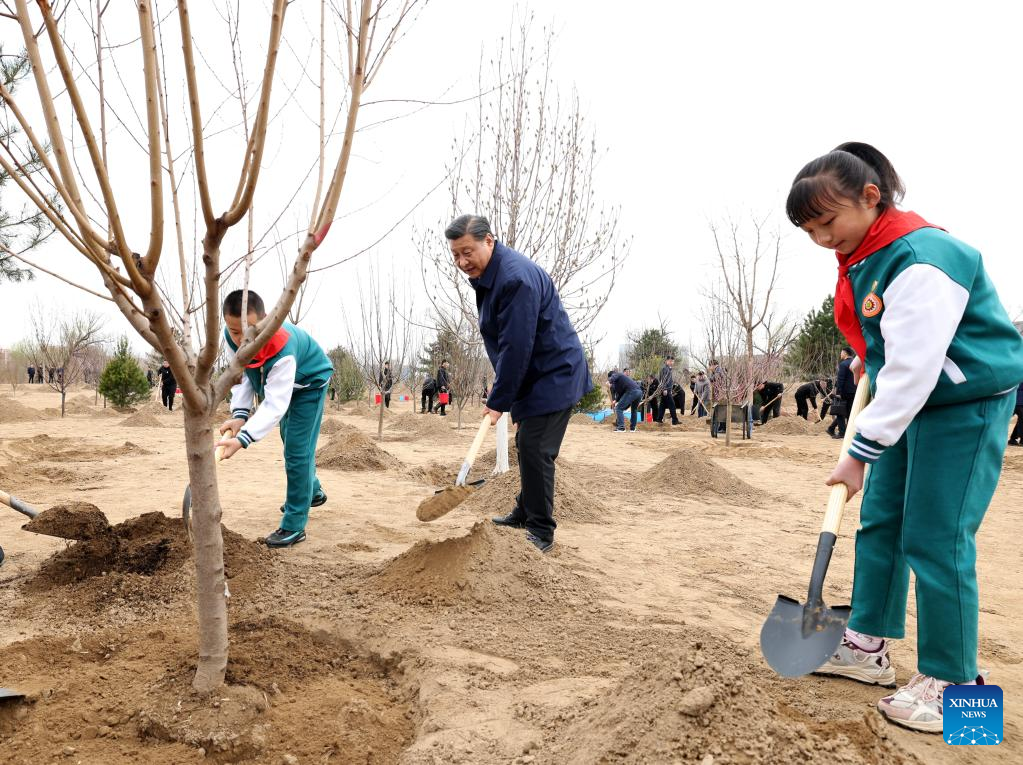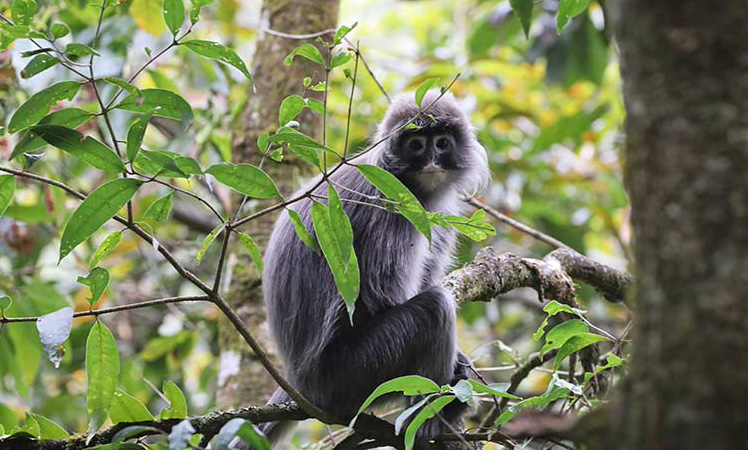Xi Focus: Plant more trees to make the country's land greener

Chinese President Xi Jinping, also general secretary of the Communist Party of China Central Committee and chairman of the Central Military Commission, plants a tree during a tree-planting activity in Daxing District of Beijing, capital of China, March 30, 2022. The activity was also attended by other leaders including Li Keqiang, Li Zhanshu, Wang Yang, Wang Huning, Zhao Leji, Han Zheng and Wang Qishan. (Xinhua/Huang Jingwen)
BEIJING, March 31 (Xinhua) -- Chinese President Xi Jinping on Wednesday planted trees in Beijing in the 10th year of his participation in the annual tree-planting activity as the top leader, demonstrating how much he values efforts to make the country's land greener.
Xi, also general secretary of the Communist Party of China Central Committee and chairman of the Central Military Commission, said he did so to make his contribution to building a beautiful China and to encourage the whole of society, especially the young people, to push for ecological advancement so that China's environment will become even better.
Over the years, Xi has placed ecological protection high on the policy agenda of the world's second-largest economy, emphasizing afforestation.
Xi's thought on ecological civilization is guiding the country towards a green future, with forest coverage expanded, the country's living environment improved, and the economy placed on a more sustainable path.
BUILDING "GREEN GREAT WALL"
As a country troubled by serious soil erosion, land desertification and soil salinization, China faces an arduous task in its afforestation work.
"In general, China's forest resources are still scarce and its ecological system remains vulnerable," Xi said when taking part in a tree-planting activity in Beijing in 2013.
Understanding the key role of a sound ecological environment in supporting China's long-term development, Xi is concerned about land restoration and afforestation.
When working in east China's Fujian Province, Xi inspected Changting County, a mountainous area formerly plagued by severe soil erosion, on five occasions to strengthen soil erosion control work.
In 2017, Xi made instructions on the Saihanba mechanized forest farm in Hebei Province, the world's largest artificial plantation, praising the "miracle" of afforestation created by workers. He visited the farm's forest rangers four years later, urging efforts to sustain the farm's role as an ecological shelter.
During a 2019 visit to another forest farm, this time in the northwestern province of Gansu, Xi operated a plow and participated in the local sand control work.
Building an ecological civilization must be a major task for China as it has grown rich and is becoming strong, Xi said, calling for a solid "Green Great Wall" to protect the ecological environment.
Thanks to afforestation efforts, 960 million mu (64 million hectares) of trees have been planted in China over the past decade. The country's forest coverage has now reached 23.04 percent, up 2.68 percentage points from 2012.
The area of desertified land in the country has shrunk by an annual average of 2,424 square kilometers, indicating a reversal from the late 1990s, when desertified land was expanding by 10,400 square kilometers annually.
GREEN GDP
While attending a tree-planting activity in 2019, Xi planted a magnolia tree in a forest park in Beijing's Tongzhou District. The site was surrounded by a chemical plant and various polluting enterprises in the 1990s, but the environment has improved since the local government started relocating the factories in 2018.
"We've seen a big change in the environment here," said Zhang Hongfeng, a local resident.
Many more places in China have seen improved living environments. In Shanghai, the per capita public green space has grown to 8.5 square meters from just 1.11 square meters in the 1990s.
China needs to provide more quality ecological goods to meet the people's ever-growing demand for a beautiful environment, in addition to creating more material and cultural wealth to meet the people's ever-increasing need for better lives, Xi has said.
Zhou Yizhe, a national lawmaker from north China's Inner Mongolia Autonomous Region, was once a logger and is now a forest ranger, as the tree farm he works at completely abandoned timber production, shifting its focus to environmental protection.
When Xi joined Zhou and other deputies to deliberate issues of national importance during the annual "two sessions" in March 2021, Zhou said that more wild animals were coming to the tree farm, and research has shown that the ecosystem in the forests and wetlands there had become a source of wealth.
Maintaining a good ecological environment is of enormous value, Xi said on the occasion, highlighting the concept of a "green GDP."
FORGING A GREEN FUTURE
China's afforestation efforts are part of a push for a greener future for the world amid global challenges such as climate change and environmental degradation.
As a faithful advocate of the Paris Agreement, China has pledged to decrease its carbon dioxide emissions per unit of GDP by more than 65 percent by 2030 compared to 2005 levels, and increase its forest stock volume by 6 billion cubic meters.
In September 2020, China announced its ambitious targets of peaking CO2 emissions before 2030 and achieving carbon neutrality before 2060.
Compared to developed countries, China faces a relatively short window of time to reach carbon neutrality after its CO2 emission peak, which will require strenuous efforts from people from all walks of life.
Participating in tree planting, switching to public transportation and practicing waste sorting have become more prevalent among Chinese citizens, who are keen to reduce their carbon footprints.
To make greater contributions to achieving China's carbon peak and carbon neutrality goals, and to safeguarding global ecological security, the country should expand its forest area, improve its forest quality, and increase its ecosystem's carbon sink, Xi has said.
Photos
Related Stories
- Chinese Wisdom in Xi's Words: "Act of kindness, no matter how trivial, is worth performing"
- Chinese president stresses neighboring countries' role in supporting Afghanistan
- Xi leads China's ecological conservation
- Xi Focus: Xi plants trees for 10th year as top leader
- Xi Jinping participates in Beijing's tree planting activity
Copyright © 2022 People's Daily Online. All Rights Reserved.










